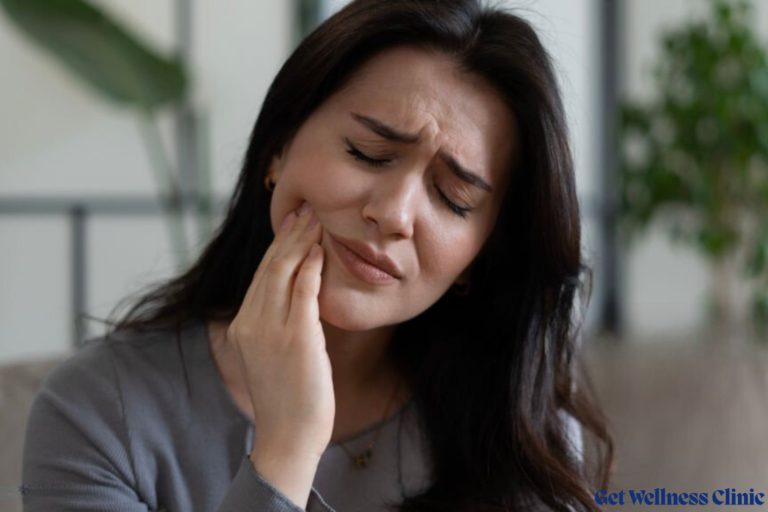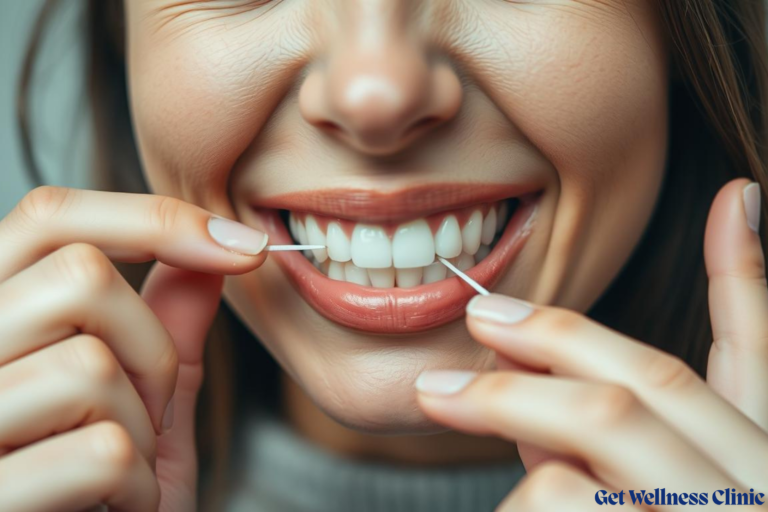Keeping your mouth clean is key to your overall health. Flossing is a simple yet powerful way to do this. But, should you floss once a day or twice?
Flossing helps remove plaque and food bits that your toothbrush can’t get. It cleans between teeth and along the gumline. This stops harmful bacteria from causing cavities and gum disease.

Flossing once or twice a day is important for your mouth’s health. Learning the best time and way to floss can greatly improve your dental health. It’s a simple step towards a healthy smile for life.
Understanding the Importance of Regular Flossing
Good oral hygiene is necessary to your health and flossing is a big part of it. Plaque and tartar can cause gingivitis, periodontal disease and cavities. Knowing how plaque forms and how flossing helps your gums can show you why it’s so important.
The Reason Behind Plaque Formation
Plaque is a sticky film on your teeth that traps bacteria. If not cleaned, it turns into hard tartar, causing gingivitis. Flossing removes plaque from between teeth, where brushes can’t reach.
Why Daily Flossing Matters for Oral Health
- Flossing stops plaque and tartar buildup & lowers cavities and periodontal disease risks.
- It takes out food and debris that cause bad breath and gum problems.
- Flossing also makes gums healthier by improving blood flow.
The Connection Between Flossing and Gum Disease
Not flossing lets plaque and tartar build up, leading to gingivitis and periodontal disease. This can cause gums to pull away from teeth leading to tooth loss. Daily flossing can stop and even reverse gum disease & keep your smile healthy.

"Flossing is one of the most effective ways to remove plaque and prevent the development of gum disease."
Should You Floss Twice a Day?
Flossing is key to good dental care, but how often to do it is debated. Some say once a day is enough, while others push for twice a day for better health.
Dentists agree that flossing is vital for removing plaque and food that toothbrushes miss. Flossing once a day is a good start to keep gums healthy and stop tartar and bacteria buildup. But, if you’re prone to plaque or have gum disease, flossing twice a day might be better.
But, there’s a catch with over-flossing. Doing it too much can irritate gums, cause bleeding and even lead to recession. Experts say don’t floss more than twice a day to avoid harm.
So, how often to floss depends on your dental health. Talking to a dental professional can help. They’ll check your teeth and gums and suggest what’s best for you.
Flossing Once a Day | Flossing Twice a Day | Over-Flossing |
| Minimum recommendation for maintaining healthy gums and preventing plaque buildup | Beneficial for individuals prone to plaque accumulation or with a history of gum disease | Can lead to gum irritation, bleeding and recession |

The decision on how often to floss should be made in consultation with a dental professional, who can assess an individual's oral health and provide personalized recommendations.
Best Times for Flossing: Morning vs Night
Flossing at the right time is crucial for good oral health. It’s recommended to floss once a day. Knowing when to floss in the morning or at night can make your routine better.
Benefits of Morning Flossing
Flossing in the morning has many benefits. At night, your mouth makes less saliva, letting food and plaque build up. Morning flossing removes these before they harden and cause tartar.
It also boosts saliva production. Saliva helps neutralize acids and clean your mouth. This keeps your mouth fresh all day.
Advantages of Nighttime Flossing
Flossing at night is great for removing daily buildup. Your mouth makes less saliva at night, making it easier for food and plaque to stick. Flossing before bed keeps your mouth clean and reduce tooth decay and gum disease risks.
It also catches any missed spots from morning flossing. This gives your mouth a deeper clean before bed.
Creating an Effective Flossing Schedule
The best plan is to floss both in the morning and at night. This keeps your mouth clean from food and plaque, helping your teeth stay healthy.
If flossing twice a day is hard, start with nighttime. This is when plaque removal is most important. Add morning flossing later for even better results.
Consistency is key in flossing. Making it a habit keeps your mouth healthy and lowers oral health risks.
Proper Flossing Techniques for Maximum Benefits
Proper flossing is key to keeping your teeth and gums healthy. By following a few easy steps, you can clean between your teeth. This helps protect your tooth enamel and gums.
- Start with a long piece of floss. Use about 18 inches to make it easy to move between your teeth without straining.
- Gently guide the floss between your teeth. Bend the floss into a C-shape and slide it in carefully. Avoid snapping or pulling, which can hurt your gums.
- Curve the floss around the base of each tooth. Move the floss up and down gently. Be careful not to snap or pull, which can harm your tooth enamel or make your gums sensitive.
- Use a clean section of floss for each tooth. This stops bacteria and plaque from spreading from one tooth to another.
- Floss both above and below the gumline. This way, you clean the whole tooth surface. It helps prevent gum disease and tooth decay.
By using these flossing techniques every day, you can keep your teeth and gums healthy. This will help you maintain a bright, healthy smile.
Flossing is a vital step in keeping your mouth healthy, but many people skip it. By flossing correctly, you can protect your tooth enamel, avoid gum irritation and lower the chance of tooth sensitivity.
The Link Between Flossing and Overall Dental Health
Flossing is more than just keeping your teeth clean. It’s key to your overall dental health. Regular flossing helps prevent common problems like bad breath, tooth decay and the need for many dental visits.
Flossing removes plaque and food bits that cause bacteria buildup. This keeps your breath fresh and your mouth clean. It also lowers the chance of tooth decay and the need for fillings or other dental work later.
Flossing is also crucial for gum health. It removes trapped food and debris, keeping your gums strong. Healthy gums support your teeth, leading to a lifetime of confident, pain-free smiles.
FAQ
How often should I floss my teeth?
Dental experts say to floss at least once a day. You can do it in the morning or before bed. Flossing twice a day, in the morning and at night, is even better for your teeth.
What are the benefits of flossing regularly?
Flossing removes plaque and food from between your teeth and gums. Your toothbrush can’t get there. This stops bacteria buildup, preventing cavities, gum disease and bad breath.
Is it possible to over-floss?
Yes, over-flossing can harm your gums. It can cause bleeding, inflammation and even receding gums. Stick to flossing once or twice a day as recommended.
What’s the best time of day to floss?
Flossing in the morning removes overnight plaque and food. Nighttime flossing cleanses the day’s debris. Choose a time that fits your daily routine.
How do I properly floss my teeth?
To floss right, gently slide the floss between your teeth, curving it into a C-shape. Rub it up and down, cleaning both sides of the tooth. Avoid snapping the floss to protect your gums. If you feel pain, talk to your dentist.
gw1fr8
I feel that is among the such a lot important information for me.
And i am happy studying your article. However should remark
on some basic things, The site style is great, the articles
is in point of fact excellent : D. Excellent task, cheers
kenzo amazon fba course review
Amazing! Its actually remarkable post, I have got much clear idea about from this post.
Oh my goodness! Incredible article dude! Thank you so much, However
I am going through difficulties with your RSS.
I don’t understand the reason why I can’t join it. Is there anybody having identical RSS problems?
Anyone who knows the solution can you kindly respond?
Thanx!!